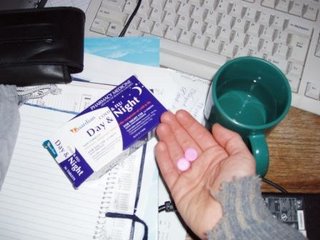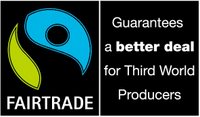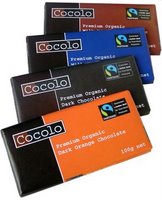Article from the Fair Trade Association of Australia and New Zealand, Winter 2006 newletter:Cocoa Speaker Tour
Every year in Australia and New Zealand we spend millions indulging in one of our favourite pastimes – eating chocolate! But for many cocoa farmers in the developing world, the reality of the chocolate industry is anything but sweet.
For Fair Trade Fortnight 2006, we invited two representatives from the Kuapa Kokoo cocoa cooperative in Ghana to come to Australia and New Zealand to share with consumers here the reality of life on the cocoa farm and why it is so important to them that consumers here choose Fairtrade chocolate.
Agnes Abrafi and Erica Kyere braved the winter chills (the temperature in Ghana rarely falls below 30 degrees) to talk to school and university students, mayors, chocolate producers, church congregations, journalists and campaign groups around Australia and New Zealand, armed with warm coats and a supply of Fairtrade hot chocolate.
A few years ago, the farmers in Agnes’s village decided to join Kuapa Kokoo, a farmer’s cooperative which sells some cocoa to the Fairtrade market, and Agnes talked about the significant improvements in her life and those of other farmers in her village.
Members of the Kuapa Kokoo cooperative typically earn about NZ$600 per annum – 50% more than other cocoa farmers in Ghana. Kuapa Kokoo is working with farmers to develop alternative income supplies, such as soap making and fabric printing. Through Kuapa, Agnes has received training to breed grasscutters, a West African rodent whose meat is considered a delicacy. Agnes now has 16 grasscutters which she sells for cash to supplement her income from cocoa. Although Agnes herself only ever had access to primary level schooling, the higher income she has received from Fairtrade means she can afford to send her daughter to dressmaking school.
Investing in education has been a priority for the members of Kuapa Kokoo, who have used some of the revenue from Fairtrade to invest in projects such as building schools, educating farmers about fair trade and sending teachers to the more remote villages.
Kuapa Kokoo has also been installing much-needed water wells and toilet facilities in the villages.
But for Agnes, one of the important benefits has been a sense of empowerment. Traditionally in West Africa, women rarely hold positions of power, but one of Kuapa’s aims is to enhance the participation of women in decision making throughout the organisation. Agnes currently holds the elected position of Treasurer in her village society and has also been the village Recorder – probably the most powerful position within a Kuapa Kokoo village society. She has been instrumental in organising the women in her community to supplement their incomes by farming corn and cassava.
Here in Australia and New Zealand, Agnes recognised the important role that she and Erica were playing in raising public awareness about Fairtrade chocolate – audiences at every venue exceeded expectations in both size and enthusiasm and the extensive media coverage of their visit has ensured their message has reached hundreds of thousands of consumers. Agnes has gone back to Ghana inspired and determined to organise the women in her village to secure even more improvements in their lives. “I know now that together we women can do anything.”
Currently, Cocolo (Aust / NZ), Trade Aid (NZ) and Green and Blacks (Aust / NZ) are the brands of Fairtrade certified chocolate available from specialist healthfood shops, selected supermarkets, Trade Aid shops (New Zealand) and Oxfam shops (Australia).




 You can buy these at Oxfam Shops (although the Hobart one is about to close down), City Organics in Criterion St (Hobart CBD), All Organic Shop (north hobart). Coles are trialling the sale of Cocolo in some NSW & Victoria stores so hopefully this goes well and will eventually in up in Tassie. (We're working on it!)
You can buy these at Oxfam Shops (although the Hobart one is about to close down), City Organics in Criterion St (Hobart CBD), All Organic Shop (north hobart). Coles are trialling the sale of Cocolo in some NSW & Victoria stores so hopefully this goes well and will eventually in up in Tassie. (We're working on it!)